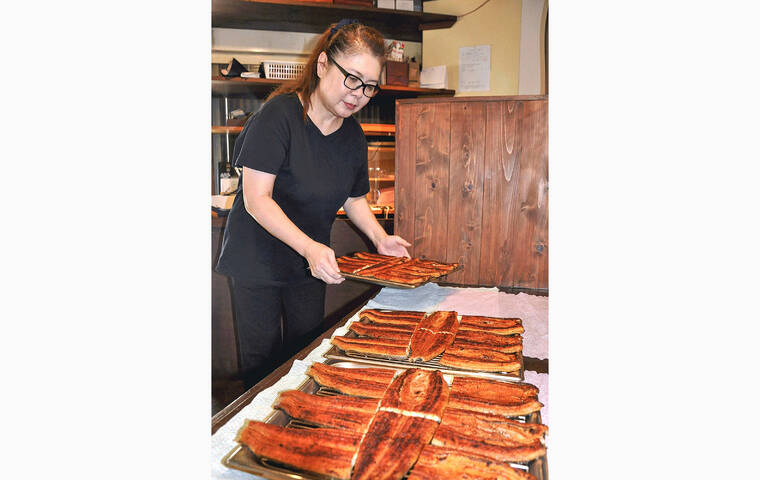
JAPAN NEWS
An employee at Naruse’s Unagi prepares eel in Minato ward, Tokyo, on July 18.
TOKYO >> The European Union could imperil Japan’s imported supply of affordably priced eel with a proposal to make all 19 eel species subject to trade regulations under the Convention on International Trade in Endangered Species of Wild Fauna and Flora, referred to as CITES, at the international Conference of the Parties 2025 slated for November.
Affordable eel from Asia
“When I want to treat myself a little, unagi (eel) is the way to go,” said a Tokyo diner with an unagi dish at Naruse’s Unagi, a restaurant chain, in Minato ward.
The temperature in Tokyo that day exceeded 86 degrees, and the restaurant was packed with customers trying to beat the summer heat. Unagi is believed to aid in fatigue and heat tolerance.
Unagi bowls at the store start at 1,600 yen (about $10.85). The restaurant keeps prices affordable by importing grilled eel farmed elsewhere in Asia.
Since opening in 2022, Naruse’s Unagi has grown rapidly, expanding to about 400 stores.
Don’t miss out on what’s happening!
Stay in touch with breaking news, as it happens, conveniently in your email inbox. It’s FREE!
But Masahiro Yamamoto, president of Franchise Business Incubation, Inc., the operator of Naruse’s Unagi, said keeping prices low has been a challenge.
“We have endured rising rice prices and kept our prices steady, but this time we may have no choice but to pass on the costs,” he said.
Processed eel targeted
The cause of Yamamoto’s concern is a proposal made in July by the EU to the CITES Secretariat.
European eel — classified as critically endangered on the International Union for Conservation of Nature’s Red List — has already been subject to trade restrictions, and the latest EU proposal calls for restrictions on the remaining 18 species.
If more than two-thirds of countries approve the proposal, countries that export eel will be required to issue permits for each export, including processed products such as grilled eel.
According to Japan’s Fisheries Agency, 60,941 tons of eel was distributed domestically last year. Of this amount, only 52 tons were domestically produced wild eel, while 44,730 tons, or 70% of the total, were imported primarily from aquaculture operations.
A Fisheries official shared concerns that, if the EU’s proposal is adopted, “additional procedural burdens and rising costs could lead to price hikes or make exporters more cautious, potentially reducing domestic distribution volumes.”
Tough negotiations
On April 16, the EU sent a draft proposal to the Japanese government aimed at gathering opinions from member countries for the CITES Secretariat.
The Fisheries Agency had its staff work during the Golden Week holidays to compile a rebuttal, arguing that “Japanese eel resources are abundant, and the proposal lacks scientific basis.” On June 19 and 20, Japan held talks with China, South Korea and Taiwan, which farm eel for export to Japan, and they agreed to work together to persuade other member countries to reject the proposal.
But the outlook is grim. Among the 184 member countries and regions, only a few have a culture of eating eel. Many negotiators have environmental rather than fisheries backgrounds, and proposals based on resource protection tend to be easily approved.

AloJapan.com